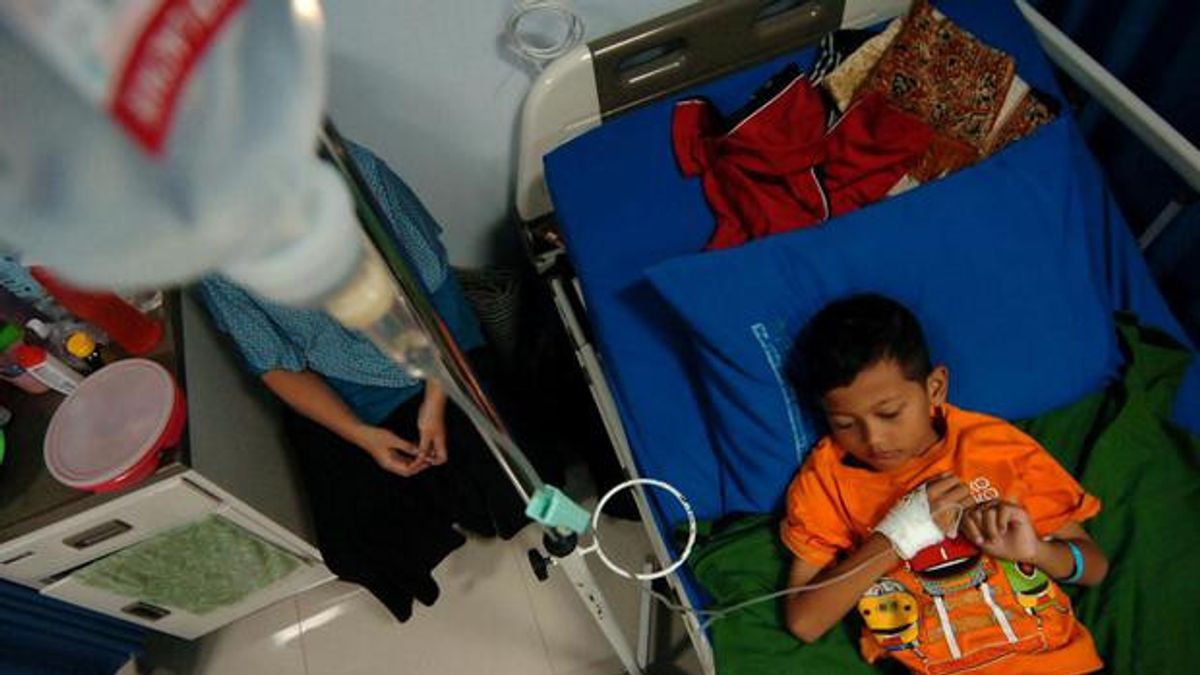JAKARTA – The COVID-19 pandemic has just subsided somewhat, the world has been shocked by the arrival of a new disease which is generally called the new acute hepatitis. Even the media called it a mysterious acute hepatitis, although in fact the disease that began to appear in England on April 5, 2022 is not something to be afraid of excessively.
This unknown type of acute hepatitis first appeared in Queen Elizabeth II with 10 cases. All cases attack children under 16 years of age, and all sufferers must be hospitalized. Through laboratory tests, no hepatitis A to E viruses were found.
Suddenly in just 5 days, in England on April 10 found there were 74 cases in the country. Shake the country. Six children from all the initial sufferers in the UK had to undergo liver transplant surgery, to cure hepatitis of an unknown type.

"Actually, what is called liver inflammation does not necessarily have hepatitis. Dengue fever and even drug poisoning sometimes cause liver inflammation. In the case of this new disease called mysterious hepatitis, the symptoms found were inflammation of the liver, but when tested for hepatitis A, B, C, and other viruses, they did not show positive results," said Lucy Endang Savitri, a pediatrician at the Jogja International Hospital (JIH). ), Surakarta to VOI.
“The Indonesian Pediatrician Association does not mention this new disease in mysterious terms. We call it acute hepatitis, because the symptoms of the disease appear immediately in less than two weeks. This is not a mysterious disease, it's just that the type has not been identified," said Lucy added.
New Acute Hepatitis SpreadAs of April 21, this new type of acute hepatitis has spread to 16 countries. The most cases are in the UK with 114 cases, currently there are even 163 cases. Then in Ireland (5 cases), Spain (13 cases, 3 of which were found in infants), Israel (12 cases), the United States (9 cases), Denmark (6 cases), the Netherlands (4 cases), Italy (4 cases). ), Norway and France with 2 cases each, and Romania and Belgium with 1 case each.
By the end of April the new disease had already reached Canada and Japan. Meanwhile, in May it has reached Southeast Asia, including Indonesia. In Indonesia, according to the Secretary of the Directorate General of Public Health at the Ministry of Health, Siti Nadia Tarmizi, there were four new cases of acute hepatitis which resulted in the death of four patients.
Three cases occurred in Jakarta, while one case was in Tulungagung, East Java. Based on the notification from the Indonesian Pediatrician Association (IDAI) received by VOI, the Indonesian Ministry of Health has held a meeting called the Coordination Meeting for Early Awareness of Acute Hepatitis of Unknown Cause on May 1.
Adults Need to Be AlertIn a virtual discussion held by IDAI on May 7, it was revealed that no new cases of acute hepatitis have been found in adults.
"So far, only children have been found. So the oldest is 16 years. But the child is actually up to 18 years old, but this is the oldest 16 years old. Most of them are actually found under 6 years old,” said Muzal Kadim, Head of IDAI's Gastro-Hepatology Coordination Unit.
Although there has been no finding of new cases of acute hepatitis in adults, it does not mean that this new disease cannot be transmitted to humans beyond the age of children.
“The actual transmission of the disease can occur anywhere and to anyone, there is no clear limitation on age. New acute hepatitis has not been found in adults, but that does not mean it is impossible to infect adults. Of course, all ages must be vigilant," said Lucy.
The most important thing to do is prevention, and the easiest way is to maintain cleanliness. IDAI has issued SOPs for pediatricians when they encounter new cases of acute hepatitis.

Prevention appeals for the community are washing hands with soap, drinking clean and boiled water, eating clean and cooked food, wearing masks, bringing your own eating utensils, keeping a distance, not contacting sick people, not swimming in public baths, avoiding playing in the playground, and do not touch doorknobs or anything that is commonly held in public.
This new case of acute hepatitis has come to the attention of the World Health Organization (WHO). The UN agency that deals with health issues has even declared an Extraordinary Event (KLB) for new cases of acute hepatitis, which attacks children in Europe, America and Asia.
WHO said that the new acute hepatitis may be caused by Adenovirus, which is a virus that usually attacks the adenoids or tonsils. This virus can attack anyone, humans or animals.

Symptoms are usually a mild cold, but there have been no cases of Adenovirus attacks that cause liver inflammation. WHO has not confirmed that Adenovirus is the cause of new acute hepatitis.
We should all remain vigilant. The goal is clear, so that the new acute hepatitis does not get crazier like COVID-19 which has claimed the happiness of millions of people in the world.
The English, Chinese, Japanese, Arabic, and French versions are automatically generated by the AI. So there may still be inaccuracies in translating, please always see Indonesian as our main language. (system supported by DigitalSiber.id)








